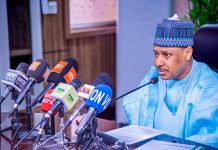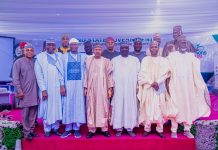The Oil and Gas Department of the Ministry of Petroleum Resources has come up with recommendations to address gaps in the availability of Oil and Gas Infrastructure in Nigeria, bearing in mind that a country is classified as underdeveloped, developing or developed based on its stock of Infrastructure.
The Ministry’s Oil and Gas Department held a 2-Day Stakeholder Workshop to review the Upstream, Mid-Stream and Downstream Critical Oil and Gas Infrastructure from Wednesday, 15th to Thursday, 16th May, 2019 in Abuja.
The intention of the Workshop was to review the current state of infrastructure, identify gaps and propose strategies for closing the identified gaps for the emergence of an optimal infrastructure network that would sufficiently satisfy the energy needs of Nigerians.
Senior representatives from the Ministry of Petroleum Resources (MPR), the Ministry of Budget and National Planning (MBNP), the Department of Petroleum Resources (DPR), Nigerian National Petroleum Corporation (NNPC), Petroleum Products Pricing Regulatory Agency (PPPRA) and Infrastructure Concession Regulatory Commission (ICRC) were all in attendance at the 2-Day Workshop.

The Honourable Minister of State for Petroleum Resources, Dr. Emmanuel Ibe Kachikwu was represented at the Workshop by Engineer Rabiu Suleiman, the Senior Technical Adviser to the Honourable Minister on Refineries, Gas, Downstream and Infrastructure, who delivered the keynote address while Engineer KamoruBusari, the Director, Oil Services Department of the Ministry anchored the workshop with Engineer Chris Ilukhor moderating.



At the end of the brainstorming session, the following communiqué was released to guide further actions in the development, management and sustainability of Oil and Gas Infrastructure in Nigeria:
COMMUNIQUE ISSUED AT THE END OF THE 2-DAY STAKEHOLDER WORKSHOP ON THE REVIEW OF UPSTREAM, MID-STREAM AND DOWN STREAM CRITICAL OIL AND GAS INFRASTRUCTURE UNDER “OIL AND GAS SECTOR REFORM: DEVELOPMENT OF OIL, GAS AND PETROCHEMICAL COMPONENTS OF THE NATIONAL INTEGRATED INFRASTRUCTURE MASTER PLAN (NIIMP).”
Introduction
The workshop was organized by the Ministry of Petroleum Recourses (MPR) with a fundamental focus on identifying the sufficiency of Nigeria’s Upstream, mid-stream and downstream infrastructure. The intention was to review the current state of infrastructure, identify gaps and propose strategies for closing the identified gaps for the emergence of an optimal infrastructure network that would sufficiently satisfy the energy need of Nigerians. In attendance were senior representatives from the Ministry of Petroleum Resources (MPR), the Ministry of Budget and National Planning (MBNP), the Department of Petroleum Resources (DPR), Nigerian National Petroleum Corporation (NNPC), Petroleum Products Pricing Regulatory Agency (PPPRA) and Infrastructure Concession Regulatory Commission (ICRC).
Welcome/opening remarks was delivered by the Director (Oil Services) while the keynote speech was given by the Senior Technical Adviser to the Honourable Minister of State for Petroleum Resources on refineries, gas, power and downstream infrastructure.
Note: Upstream infrastructure
The workshop, in line with the agenda, discussed midstream and downstream infrastructure on the first day. The gaps and recommendations for the first day are as tabulated below
| S/N | Issue | Gaps | Recommendations |
| Midstream and Downstream Infrastructure | Low refining capacity utilization and yield | A comprehensive technical audit of obsolete equipment and facilities to ascertain a way to bring them up to date; | |
| Insufficient national refining capacity | There is a need for the establishment of more refineries in the nation to enable the satisfaction of more than 40 million liters demand domestically; | ||
| Open-up the refineries for equity sales to all interested investors both locally and internationally; | |||
| Inadequate policy/regulation on domestic refining | |||
| Pipeline vandalism | Deployment of drone surveillance should be utilized Host community participation Service level agreement between employers and employees | ||
| Obsolete equipment and facilities | Equity should be given to original equipment manufacturers | ||
| Inadequate inland storage facilities (strategic stock) | Third parties should be encouraged to invest in this area through adequate sensitization Propose a framework for the development of strategic reserves of products | ||
| Dilapidated storage and pumping facilities | |||
| Infrastructure bottlenecks and congestion | |||
| Environmental hazards | |||
| Lightering due to shallow draft | Establish a framework for systematic regular dredging of all ports that is not government driven | ||
| Expensive processes | |||
| Poor pipeline integrity | |||
| Technology | |||
| Human factor | There should be a culture of ownership built into the employees |
The second day focused on the Gas Infrastructure and the following recommendations were made:
| S/N | Issue | Gaps | Recommendations |
| Gas Infrastructure and LPG Penetration | Inadequate pipeline network system | Encouragement of public private partnership in developing the pipeline system Creation of linkages between all existing gas pipelines Gas hubs should be created in the six geo-political zones in the country | |
| Inadequate transportation mechanisms (pipelines and rails) | Revamping the existing products rail lines Ensure the expansion of the rail networks to other sources of products | ||
| LPG affordability, accessibility, availability and acceptability | Government should ensure that start-up package for LPG utilization is amortized Creation of micro distribution centresin the 774 LGAs Revamping and creation of more butanization plants Vigorous sensitization on the advantages of using LPG as household fuel should be pursuit Sensitization on safe utilization of LPG should be pursuit | ||
Recommendations:
Based on the highlighted areas, the following recommendations were made:
Low refining capacity utilization and yield
There is an urgent need for an infrastructure re-birth programme for the oil and gas sector;
- New negotiations should be done in such a way that domestic refining obligations are adequately captured for new entrants;
- Deepen support for the on-streaming of Dangote refinery as that would help to create a healthy competition in the development of local refineries;
- The public private partnership should be considered as another funding model for the development and upgrading of infrastructure deficits in the oil and gas sector;
The development of the downstream sub-sector should be viewed strictly from business-driven perspective
The culture of Management of change process must be built into every infrastructure project especially in the oil and gas henceforth.
Day-2
- Associate gas framework agreement should be enforced to ensure compliance
- Funding for LPG penetration should be from domestic investors
- Tariff waivers should be given to potential investors in the LPG sector
Signed:
Olujimi Oyetomi
Head, Press Unit,
Ministry of Petroleum Resources.





